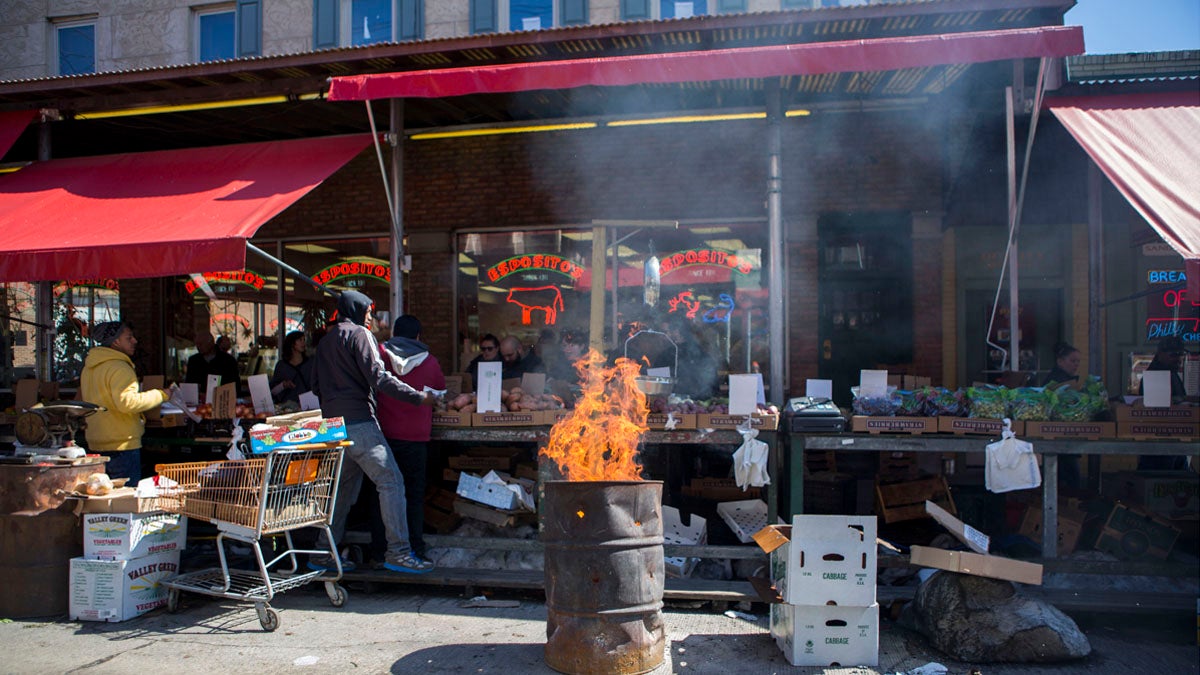In case you missed it: This week’s good reads about Pennsylvania cities

Grapple is back with new episodes dropping on April 12. In the meantime check out the preview and past shows. Vendors sell produce in the Italian Market neighborhood on South 9th Street in Philadelphia, Pennsylvania. (Jessica Kourkounis for Keystone Crossroads)
Uber finally settles its long-running dispute with the Pennsylvania Public Utility Commission, the soda tax controversy drags on and the nuclear energy industry in Pennsylvania is in trouble if President Trump’s budget cuts go through.
In a case one official called “intense, complex, and contentious,” ride-sharing company Uber finally settled a long-running dispute with the Pennsylvania Public Utility Commission to the tune of $3.5 million.
The money will go into the state’s general fund.
The civil penalty is one-third of the original $11.4 million fine levied against Uber.
The company operated for six months without a license in 2014, and a month after a cease-and-desist order.
The Pennsylvania suit is only one of many lawsuits and scandals Uber has faced in recent months.
In March alone, Uber’s president quit, one of its self-driving cars crashed in Arizona and the company dealt with a #DeleteUber campaign on Twitter after its CEO was caught on video arguing with an Uber driver (he later apologized).
Expungement, soda tax objections
In Philadelphia, the district attorney’s office is objecting to more and more expungement cases — where charges are cleared from a person’s criminal record. The objections are hurting their low-income clients, say attorneys with Community Legal Services, one of the city’s biggest filers of expungement petitions in Philadelphia.
Many of the petitions are requests for partial expungement, in which some charges are cleared.
Jamie Gullen, a CLS attorney, says it used to be that the Philadelphia DA’s office rarely objected to partial expungements on any grounds — but that’s changed now.
Objections to the soda tax, Mayor Jim Kenney’s signature policy achievement, continue.
At issue this week was whether Philadelphia enacted an illegal double tax or whether the structure of the tax protected it legally.
A panel of seven appeals judges convened Wednesday in Pittsburgh to hear arguments in the case, which was brought and funded by the beverage industry. At the heart of the decision will be the Sterling Act, a 1932 law that gives Philadelphia the right to impose its own tax as long as it is separate from those the state imposes.
If the beverage industry wins, plans for expanded pre-K and improvements to parks, recreation centers, and libraries could be put on hold or shelved altogether.
A riveting tale of survival
From PlanPhilly this week: The story of Kau Our, whose life is one of survival, persistence, and courage.
As a young man, Our worked as a schoolteacher in his native Cambodia. But the mid-1970s were a bad time to be an educator in that country.
As the Vietnam War sucked in neighboring Cambodia, the Khmer Rouge regime made lists of those they planned to murder, including teachers like Our.
Our managed to survive. But more than 40 years later, he stills pauses to collect himself when he talks about fleeing Cambodia.
Gov. Wolf’s crackdown
Governor Tom Wolf wants on crack down on companies that reneged on their promise to create new jobs with taxpayer dollars.
Wolf’s idea is to fund a new apprenticeship program with the money those companies received and put it into a program that helps people find work. He wants the Department of Community and Economic Development to revisit the deals the state made with companies under previous governors to see if public dollars were spent in job creation.
“This was not meant to be a free gift on the part of the taxpayers of Pennsylvania,” Wolf told WHYY/NewsWorks reporter Katie Colaneri. “We’d like to use that money for a public good that actually has a payback, and this is one really important one.”
A struggle for water and power
State environmental agencies will have to do more work with less money if the $2.6 billion cuts proposed by the Trump administration goes through.
Last year, Pennsylvania was slapped with a letter by the EPA warning that its understaffed water program was failing to enforce safe drinking water standards.
Speaking of struggling, slowing demand for electricity combined with a glut of cheap natural gas has made it hard for the nuclear power industry to compete.
Pennsylvania lawmakers responded by forming a new Nuclear Energy Caucus. And it’s expected they’ll introduce legislation this year to helped the state’s five nuclear power plants stay online, though caucus co-chair Sen. Ryan Aument (R-Lancaster) made it clear that he’s not interested in a subsidy or bailout approach.
Lastly, Grapple is back! Starting April 12, the Keystone Crossroads podcast will lead off with stories on immigration from Philadelphia to Hazelton in Episode #14. Three new episodes will follow, covering a range of hot button issues, including public school funding and race relations. Listen to the preview here.
WHYY is your source for fact-based, in-depth journalism and information. As a nonprofit organization, we rely on financial support from readers like you. Please give today.


